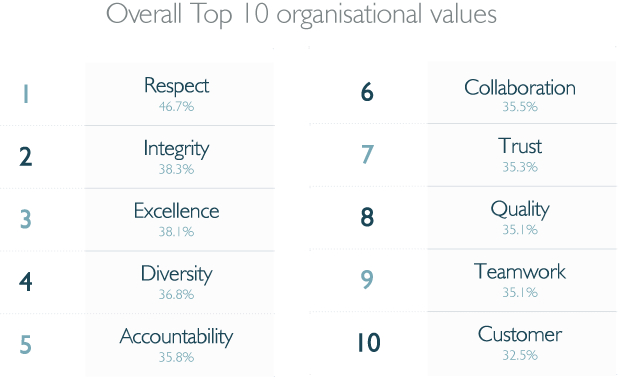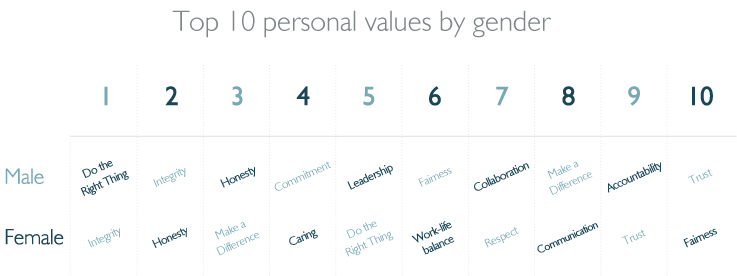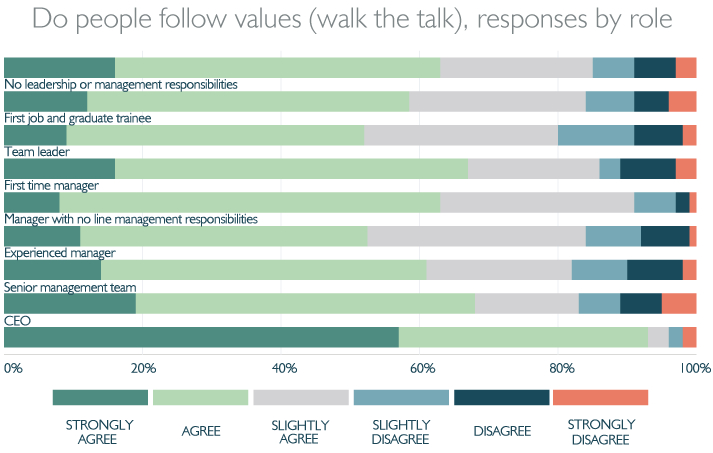Reconciling organizational and personal values: dissecting the ILM’s latest research
Our personal values not only shape the way we behave, they influence the choices we make. Historically, many of those choices have been determined by the decisions imposed by society, such as our political allegiances or religious beliefs.
However, we are increasingly seeing evidence that our values play a much greater role in our everyday choices. The brands we align with as consumers, or our attitudes towards energy and recycling, are great examples of how our personal values play a significant role in our behavior.
As consumers and voters have posed questions and expectation on retailers and governments to listen and to change, it is not a surprise that the employee/employer relationship is also coming under strain.
Whether a company, non-profit or government department, core values set the bar for the way an organization behaves, both morally and ethically, and show the positive behaviors they and their employees should aspire to. When these values come to life, they can motivate employees and transform a company’s performance.
However, just having well-meaning values is not enough today. Organizations are only too aware that employees, both current and future, are beginning to behave like consumers and voters do. They will act if their personal values are being overly compromised.
So just how do organizations reconcile personal and corporate values and bring everyone together, and working in the same direction? The Institute of Leadership and Management has looked at this issue in depth and come up with some interesting findings.
Where there’s overlap, that’s when the magic happens
Giving employees some input into the selection of corporate values is a good start. But co-production – when the process actively involves those with least power – is the gold standard. The more people are involved across an organization, the better it’s likely to turn out. But how many organizations are really doing it?
The ILM’s research suggests organizations think employees are more involved in the value setting process than employees themselves do. The research discovered only 35% of respondents are involved in deciding their organization’s values. The only groups who actually had significant involvement were senior manager teams (60%) and CEO roles (97%). Younger workers are also often excluded in the setting process too – just 21% of employees aged 18-30 are getting involved. This risks employees feeling like values are being imposed on them, and is a wasted engagement opportunity.
How diverse are organizational values?
The study identified the top organizational values by both sector and industry. Top of the overall list is respect. That’s followed by integrity with excellence a close third.

Dig deeper and you start seeing variances by both sector and industry. The private sector puts customer as the highest-ranking organizational value. The top value in the public sector is respect. Collaboration and cooperation top the list for third sector organizations.
None of this is particularly surprising, nor is the appearance of caring in the top 3 for both the health and charity industries. In fact, it’s the highest-ranked value in health – something we’re seeing daily evidence of during the current coronavirus pandemic. The military and defence industry has integrity and leadership at the top – again, in that type of environment, that’s probably what you’d expect.
It’s worth noting honesty didn’t make an appearance in the financial services industry’s top ten. When you consider the origins of the 2008 financial crash, it does raise questions about the steps taken since, to try to restore faith in the way these institutions are run.
What about personal values?
The report gives us insights into what matters to employees and by extension, what they want from the organizations they work for. The top three personal values are integrity, honesty and do the right thing. Even when the data’s sliced up by gender, age and industry, integrity and honesty remain commonly held values throughout.
There are some revealing demographic differences. Younger employees aged 18-30 are the only group not to have either integrity or honesty in their top three. Instead, they prize doing the right thing and work life balance. Could it be that such obvious values are becoming a little outdated? Should integrity and honesty be a given in this day and age, the research would suggest so.
The research flags up gender differences as well. Half of men’s top 10 personal values overlapped with organizational values. But only three out of 10 women’s values did. That indicates female personal values don’t fit so well with organizational values. Is it because many workplaces still tend to be male-dominated? If it’s the senior cohort setting the values, might there be unconscious bias towards male attributes which contribute to workplace gender inequalities? It’s certainly worth considering.

Do employees walk the talk and follow the organizational values?
Most people (over 80% in each role type) generally agreed that staff in their organization did follow its core values.
That’s positive, but it comes with a note of caution as there was variation in the strength of agreement. CEOs were more convinced that values are being followed: 57% of CEOs and 19% of senior management team members strongly agreed. Lower down the organization the strength of agreement had less conviction. It seems there might be a tendency for CEOs to view their companies through rose tinted glasses.

So to what extent are personal values and organizational values really aligned?
The short answer is probably nowhere near as much as they could – or should – be.
Only half of the most highly-rated organizational values overlap with the top-rated individual ones. Around 70% of employees’ personal values are not being championed by employers.
Despite various CSR initiatives, and a perceived increased focus on wellbeing, the more altruistic values don’t feature as heavily as you might expect from an organizational perspective. Respect, integrity and trust did make prominent appearances in both value sets. But there was a notable absence of a particular cluster of values for the organization. Many of the disconnects are in the general area of doing good and supporting others. Honesty, do the right thing, making a difference, commitment and caring: none of them featured in organizations’ overall top 10. Making a difference took fourth place on the overall top 10 list of personal values but, apart from charities, didn’t even appear in any other industries’ top 10s.
Read more: 50 perfectly-formed mission statements
In fairness, all the values identified in the report are worthy ones to have. The core issue is the mismatch in the alignment. Employees are increasingly seeking to work for employers whose values align with theirs. Yet it appears there are still many disconnects.
Could the answer lie with a different, more inclusive approach to co-creating values? This report should encourage companies to actively think about what they can do to increase alignment. At a time when so much is in turmoil and flux, it may also turn out to be an opportunity to rethink what a company and its employees truly want to stand for.


 30 ideas to help a new starter in their first week
30 ideas to help a new starter in their first week
 The value of external feedback in the workplace
The value of external feedback in the workplace
 Expand the power of recognition with Partner Appreciation
Expand the power of recognition with Partner Appreciation